Since the Aviator cat’s out of the bag with last Wednesday’s rave review by Variety‘s Todd McCarthy, it’s okay to respond to his praising of the film’s CG-bolstered aerial photography sequences. They’re not “eminently satisfying,” as he described them, because over and over they reach out from the screen, grab you by both lapels and shout, “Hard drive!” McCarthy says “it’s not that you can’t tell when a flight is being digitally rendered, but it’s all done amazingly well — the degree of artifice surrounding the entire picture allows the computer work to fit in gracefully rather than to stick out.” This is emphatically not so. The aerial shots of Hughes flying those World War I biplanes, the H-1 Racer, the XF-11 and the Spruce Goose constantly demand that the viewer foresake any semblance of belief in what is supposed to be organic reality. More than once these planes fly right into the lens…nothing but flagrant CG show-off crap. The rule is the rule: CG must be invisible or it’s nothing. That shot of Lenin’s statue being helicoptered across the Berlin skies in Goodbye Lenin, for example…totally believable.
Month: November 2004
Thanks to L.A. Times columnist
Thanks to L.A. Times columnist Patrick Goldstein for the front-page plug in today’s (Tuesday. 11.30) “Big Picture” column, in which he quotes my Million Dollar Baby blurb from last week (“Trust me, it’s a multi-Oscar nominee — Best Picture, Best Director,” etc.). It would’ve been a mite cooler if he’d mentioned Hollywood Elsewhere as my residence and not just referred to me as being linked on Oscarrace.com. After all, he spells out Movie City News in his discussion of David Poland’s Oscar predictions. I’ll have some reactions to Patrick’s Oscar contender assessments in Wednesday’s (12.1) main column.
The mystery of James L.
The mystery of James L. Brooks’ Spanglish (Columbia, 12.17) will begin to unravel early next week. Is it Oscar material or just a (presumably) good relationship comedy? Will Tea Leoni’s performance hit the right notes or…? I keep thinking back to a report I heard several weeks ago, which is that Cloris Leachman, playing Leoni’s wine-drinking, acid-tongued mom, has all the zingers…
Alexander star Colin Farrell has
Alexander star Colin Farrell has been reading the reviews of Oliver Stone’s historical epic since its Wednesday debut and admits, “It’s been f***ing hammered!” He’s told Toronto journalist Bruce Kirkland that “I don’t usually read [reviews], but I read them this time because I love the film so much and I have so much invested in it emotionally — and I’m worried more for Oliver than for me because he’s highly sensitive, as tough as he is.” Alexander, he emphasized, “is an important thing in my life…a lot of my life has gone into it. My son was born during it, and a lot of my son is there in my performance, whatever my performance is. So it certainly affects me. I can’t abstract myself from it at all. I can’t be subjective. Having said that, I do think a lot of [the negativity toward the film] is personal, with respect to Oliver.”
I am sooo outta here,
I am sooo outta here, sooo not working over the next four days. Happy Thanksgiving to anyone paying a visit. I don’t see myself doing any more than six, seven work sessions (adding items, editing stories) between now and Sunday. Chill-out time, man.
Uhmmm…I got it wrong about
Uhmmm…I got it wrong about Mike Leigh’s Vera Drake in a WIRED item I wrote two or three days ago. It played at last September’s Venice Film Festival and not, apparently, at the Toronto Film Festival.
Sticks and Stones There’s a
Sticks and Stones
There’s a scene in Lawrence of Arabia that comes just after General Allenby (Jack Hawkins) tells his artillery officers to bomb the hell out of the Turks. “Pound them, Charlie…pound them,” he says.
Cut to Lawrence (Peter O’Toole) and Ali (Omar Sharif) riding their camels at the head of the Arab army at night, looking at the flashes of artillery fire on the horizon and listening to the distant thunder. “God help them,” says Ali. “They’re Turks,” says an unconcerned Lawrence. “God help them,” Ali repeats.
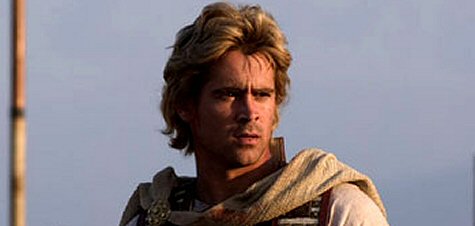
It’s 11:55 pm on Tuesday night, Oliver Stone’s Alexander opens tomorrow, and the Rotten Tomatoes artillery is raining death upon it. When a movie gets hammered this hard, my tough-guy thing goes out the window and I start feeling all soft and mushy. “Poor Oliver,” I hear myself saying. “He tried so hard, wanted so much to make this film great.” Forget it, most of my colleagues are saying. He’s fried, he’s over, the movie’s a mess. “He tried so hard,” I repeat.
< ?php include ('/home/hollyw9/public_html/wired'); ?>
All right, Alexander is a mess. There’s no way around that. You don’t need to hear any details from this corner. Go to Rotten Tomatoes…it’s amazing. The page is soaked in green. 37 pans out of 43 reviews.
“It’s one of the greatest adventure tales of all time,” Stone told the Toronto Sun ‘s Bruce Kirkland the other day. “It’s equal to Sinbad or any of them. You would have to say that this guy outdid Achilles, he outdid Jason, he outdid Dionysus. He’s a god! And the guy did it in his lifetime. It’s a great story.”
But it’s not a great story. That’s the odd thing about it. It’s a military saga writ large, a fascinating ancient myth, a tale of great hunger and ambition and mother-loathing and competing with dad…but a great story it’s not. Not the one that Stone tells, at least. But I still worship Rosario Dawson’s breasts.
I have this half-formed idea kicking around in my head about the fact that Stone started thinking about making a movie about Alexander the Great 30 years ago, and then spent major portions of the past 15 years working to bring his story to the screen.

Maybe sometimes when a film stews inside a filmmaker for too long, it becomes too big like some swollen oversized fetus, and gets all caught up in itself with the umbelical cord wrapped around its neck, and a successful delivery is impossible. This happened also with Toys, Barry Levinson’s long-delayed dream movie.
And yet Clint Eastwood’s years-long effort to make Unforgiven turned out splendidly. But then Clint didn’t write it or work it through in his head (that was David Webb Peoples’ job), so maybe that’s a different deal.
I wrote a big report on Alexander the Great for my Ancient and Medieval History class when I was twelve or thirteen. I really wanted this movie to work. I’m not happy that it doesn’t.
I was even mildly disappointed by the big battle scene between Alexander’s troops and the much larger forces of the Persian king Darius. I was expecting a battle pumped up with adrenaline and ecstasy and all kinds of Oliver craziness, but Stone doesn’t handle it that much better than Robert Rossen did in the 1956 Richard Burton version. And Rossen shot his version without title cards.
I was also surprised to learn that the Persian king’s name, according to Stone’s film, is pronounced Dar-EYE-us. Wow, I’ve been saying it wrong my whole life.
Palookaville
The single overriding concern henceforth for any journo writing about Clint Eastwood’s Million Dollar Baby (Warner Bros., 12.17, limited), even cryptically, is to not spill the plot. That means don’t even hint at it…right?
I went into Monday night’s screening expecting some kind of Clint riff on Girlfight, and it is that for the first 100 minutes or so….but then it turns and does something else and it’s like “whoa, daddy…oh, man” time. It hits you like a freight train and leaves you saddened and bent over and coping with the backwash.
Before seeing it the night before last I didn’t know anything about the source material — “Rope Burns: Stories From the Corner”, a short-story collection by the late fight manager and cutman Jerry Boyd, who wrote under the pen name of F.X. Toole — and not one iota of buzz had gotten through. It’s a great thing to see a good movie cold.
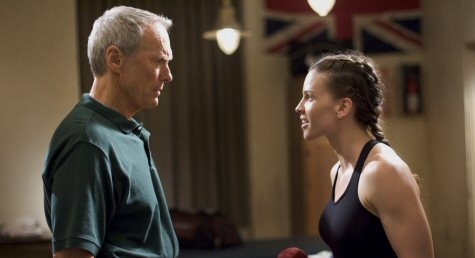
Okay, I’m warming it up a little for the readership, but I’m holding my water. I don’t trust critics to keep their hint-hint instincts at bay, so play it safe and put on your blinders and don’t read any reviews on opening day. See it first, I mean.
Repeating my WIRED praise, Baby is a major art film. It is in the same realm of accomplishment and penetration as Clint’s Unforgiven, and may be his best film ever. In the view of at least one major critic who attended Monday’s screening, it emphatically is that.
It follows that it’s an Oscar contender on several fronts — Best Picture, Best Director (Eastwood), Best Actor (Eastwood), Best Actress (Hilary Swank). I’m not alone on this — the four or five serious journos I’ve spoken to who’ve seen it are all seriously impressed. Nobody’s hedging.
All right, one former critic I spoke to was shaking his head, but mainly because he wanted to see something else.
My kids, I fear, are going to be reluctant to see it, much less embrace it. It’s as far away from an MTV heebie-jeebie movie as you can get. Eastwood may be the only major director left in this industry who paces his films without regard to velocity for its own sake…..who just lets his stories unfold according to their own speed. Baby takes its time but it gets where it’s going.
The widescreen cinematography by Tom Stern (Mystic River, Blood Work) is straight and unpretentious, but I love the more-than-occasional detours it takes into darkness and shadows. It felt to me like the return of Gordon Willis or Gregg Toland in their respective heydays.
All the hoo-hah means that Swank is once again up against Annette Bening — they faced each other before in the ’99 race when Swank’s Boys Don’t Cry performance beat out Bening’s in American Beauty.
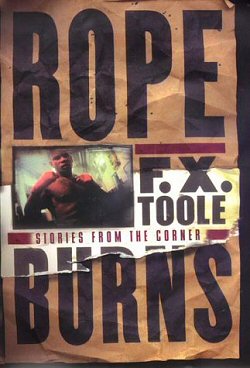
What’s partly amazing about Million Dollar Baby is how quickly it was thrown together.
I’m told it went into production only last August 1 and wrapped in late October, or something close to that. The script by Paul Taggis (who also wrote and directed Crash, one of the hits of last September’s Toronto Film Festival…which Lions Gate is opening next year) was, I’m told, put into production only a couple of months after Eastwood first read it. Eastwood said okay, hired his cast, called up his crew people and said “let’s go, we’re doing this”…wham.
Here’s a letter from a guy named Kyle Long. He says he’s a legit screenwriter (sold a spec, gotten two jobs since) and not a Warner Bros. plant. I think I believe him:
“I saw this film last night at the DGA. Wow…what a movie! Thanks to the fact that the idiots at WB have yet to produce one trailer or commercial, I wasn’t that excited going in — I just thought it was some chick boxing flick, and who could get excited about that?
“But in my humble opinion, what I saw rivals Sideways as the best movie of the year.
“Without ruining it for you (if you haven’t seen it already), Million Dollar Baby is really two movies in one. The first is an excellent take on a kind of boxing movie that we’ve seen before. It’s funny and inspiring and it just works. The second movie (basically the third act) completely caught me by surprise and moved me to tears on several occasions.
“Based on what I’ve seen so far, it gets nominated in every major category and may be my favorite right now for Best Picture. Paul Haggis is a lock for best adapted screenplay. Eastwood (in his best performance…well, maybe ever) gets a nod, as does Hillary Swank and Morgan Freeman (is there another actor on the planet who delivers voice-over lines better?).

“Eastwood has hit his stride at 74…unbelievable.
“I really can’t believe how poorly a job Warner Bros. has done marketing this flick. I mean, I live in LA, work in the biz and I barely knew about it. Not only will this flick be a critical fave, but it could be a major hit as well (it will play everywhere). Meanwhile, the suits have decided to blow their wad on Alexander, which makes no sense at all.
“This biz can suck the creativity right out of you sometimes and if nothing else, movies like Million Dollar Baby and Sideways recharge me and remind me why I wanted to write movies in the first place. Just a great, great flick.”
I included Long’s rant about Warner Bros. publicity only to debunk this impression. The Burbank crew only just saw Baby a little while ago because Eastwood played it that way. True to form, the guy’s been holding his cards to his chest. Clint runs his own show on his own clock, and won’t be muscled into anything he doesn’t feel like doing.
So lay off WB marketing — they’re just playing cards they’ve been dealt.
Talking Funny
If there’s a choice, movie stars should steer clear of exotic accents unless they can do them perfectly. Sometimes it’s not even a good idea if they can.
For the most part U.S. audiences don’t want their name actors to try and be Laurence Olivier. Stars become stars partly because people like their unchallenging steadiness.
Exceptions crop up every now and then. Owen Wilson is a star because he’s Owen Wilson in everything he does — same delivery, same intelligent-stoner phrasing, no variations. And yet he manages a surprisingly good Kentucky accent in The Life Aquatic with Steve Zissou. I’m impressed.
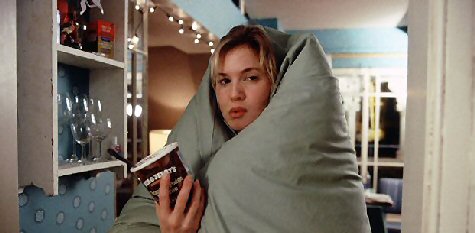
Renee Zellweger didn’t have a choice with Bridget Jones Diary: The Edge of Reason (Miramax, now dying in theatres everywhere). Bridget is a London working girl and that’s that. Zellweger went with what I remember was a passable English accent in the original Bridget Jones Diary three years ago, but some feel she fudges it in the sequel, and she’s taking a shellacking for this.
A less confident director than Mike Nichols might have asked Julia Roberts to go with a British accent for her performance as Anna, a divorced London-based photographer, in Closer (Columbia, 12.3). But he didn’t, wisely, and it’s fine.
You might think for a minute or two as this London-based drama begins, “Hey, she’s not sounding British”…and then you’ll forget about it. Roberts probably would have blown it if she’d tried. She’s not Cate Winslet.
Ancient-era period dramas can get away with any kind of accent as long as it’s uniform. I have no problem with Colin Farrell and his Macedonian officers speaking in Irish accents in Oliver Stone’s Alexander.
Same deal with Jesus Christ, John the Baptist and the twelve disciples sounding like New York-area goombahs in Martin Scorsese’s The Last Temptation of Christ — a uniform system. It’s also acceptable that Kirk Douglas and his slave army lieutenants in Spartacus use regular-guy American accents and their Roman opponents talk in British or cultivated mid-Atlantic accents.
As long as everyone sticks to the scheme…
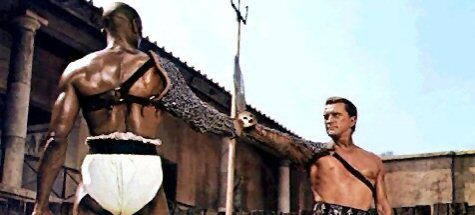
Angelina Jolie’s Russian accent (Time critic Richard Corliss describes it as “crypto-Carpathian”) obviously goes against the system in Alexander. The idea, apparently, is to convey that she’s a Medusa snake woman who has no allegiances or agenda other than her own, but it threw me anyway. The campiness seemed overbaked.
Actors shouldn’t do medieval English history dramas without sounding vaguely like like they belong in the milieu, but half-assed attempts are worse than none at all.
Kevin Costner could have easily gotten away playing himself in Robin Hood: Prince of Thieves, but he went with a mid-Atlantic accent instead and seemed off-center all through the film. His Boston accent in Thirteen Days made me want to hit him, and I still flinch at the memory of his Jim Garrison Nyawlins-speak in JFK.
Clark Gable played Rhett Butler accent-free in Gone With the Wind, and it was one of his smartest moves ever. He would have sounded grotesque with an attempted Charleston drawl.
Even character actors need to watch their step with this stuff. Every time I watch Shane Elisha Cook, Jr.’s Alabama accent (“Ain’t no one runnin’ me off maaah cleem!”) makes me wince.
Blowing Town
This column is shutting down until Monday. I’ll be doing the Thanksgiving thing in Connecticut with my parents. I may tap out a WIRED item or two if boredom creeps in but don’t hold your breath.
Two Strangelove‘s
I said this in a short piece a few weeks ago but it’s gift-buying time so here goes again for good measure. Dr. Strangelove fanatics should think twice before buying Columbia Tristar Home Video’s 40th anniversary two-disc special edition, which hit stores three weeks ago.
The extras are great (four doc featurettes plus a quickie interview with former Defense Secretary Robert MacNamara, who never gets around to actually mentioning the film) but the presentation of the film isn’t right.
The problem is the decision by CTHV to present Stanley Kubrick’s 1964 black comedy in a matted 1.85-like format, with black bars on the top and bottom of the image.
In accordance with Kubrick’s wishes, it should be framed instead in a 1.33 to 1 aspect ratio with an occasional shifting to a rough 1.66 to 1. This is what you get on the still-purchasable CTHV Strangelove DVD that came out in February ’01. That’s why it’s the better buy, even if it doesn’t have as many extras as the new version.
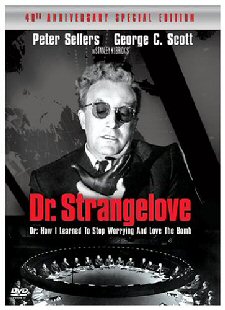
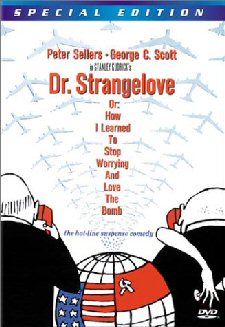
On top of which I did a comparison of the ’04 and the ’01 versions on my TV set, and I swear the ’04 didn’t look as bright or sharp as the earlier version…even though it makes no sense that CHTV would degrade the quality.
Kubrick wasn’t into having his films shown in 1.85 matted formats. He was a full-frame type of guy, and you may have noticed that the full-frame images in his films really are full frame — not just 1.85 images with sides chopped off.
In any event, the framing on the ’01 DVD is quite beautiful, I feel, because of all the extra space in each shot. I don’t know why I just used the word “extra” because it looks just right — exquisitely framed and airy, and no boom mikes popping in.
The irony is that the Amazon.com description of the transfer of the 40th anniversary DVD explains exactly how it should look but doesn’t — or didn’t, to be precise, on the screener I was sent by CHTV a few weeks ago.
The Amazon copy reads, “Because this movie was originally shot using various aspect ratios, the proportions of the screen image will change periodically throughout the movie. This transfer (with its changing aspect ratio) was approved by director Stanley Kubrick himself.”
If anyone has a purchased copy of the 40th anniversary Strangelove that conforms to this standard (which would mean I was sent a screener that hadn’t been formatted correctly by accident), please write in and say so.
Prick Up Your Ears
Vikram Weet of Los Angeles was first to identify last Friday’s dialogue clips.
The “lesson in civics” in Clip #1 is spoken by Otto Kruger in Fred Zinneman’s High Noon; the lawman he’s speaking to is Gary Cooper. The interrogator in Clip #2 is Peter Sarsgaard in a third-act scene from Shattered Glass; the irritating little twinkle-toes with the nasal Toronto accent is Hayden Christensen; the dialogue in Clip #3 and Clip #4 is spoken by Gene Hackman and Jeanne Tripplehorn in Sydney Pollack’s The Firm.
Today’s clips are it for a week because there won’t be a new column on Friday, 11.26. Clip #1 is an actor of international renown using metaphor to lay some moves upon a young man he happens to fancy for the moment; Clip #2 and Clip #3 are two longish confessionals, one spoken by a despairing middle-aged character (and played by a certain Oscar-winning actor) and the other by a renowned Broadway character actor; and Clip #4 is an interrogation scene between a somewhat older woman and a teenage male.
Send in your answers before the holiday starts. I’ll post the winner on Wednesday, 12.1.
More Alexander
“I went to a recent screening of Alexander feeling reasonably sure that it would be superior to Troy, which it somewhat resembled. On the way out, however, I wasn’t at all sure that that’s the case.
“What was Oliver Stone thinking? Angelina Jolie as Colin Farrell’s mother? A mother who ages at least 20 years over the course of the story — which is set in a time when the average life expectancy was, what, maybe 35? — without so much as gaining a wrinkle or a gray hair?
“And all of Alexander’s men speaking in Irish accents? I would never have guessed Macedonia was a stone’s throw from Dublin.
“How about all the pointless flirting with that dancer who looked like he was auditioning for a remake of The Crying Game, or the irritating will-they-or-won’t-they? scenes with Farrell and Jared Leto?

“And what about those dozens of endless, stilted speeches that seemed to stop the film dead every time it needed a strong shot of adrenalin instead?
“And once again, Stone proves that in his world women exist only to be painted in the most vicious and unflattering colors. There are only two major female roles in the film: a demented, snake-charming man-eater of a mom, and an ill-tempered hottie whose few lines are dripping with venom.
“A few of the battle sequences were impressive (and most of the others were ruined by the shaky cinematography, which made the scenes in the Indian jungle stuff seem like Alexander and company had strolled into Jurassic Park by mistake) and the sets looked great…
“But what a horrible waste of Farrell: an inventive, charismatic actor is reduced to little more than a wide-eyed, slack-jawed mannequin, crowned with an amateurish dye job that reminded me of the girls in my junior high who tried to emulate Farrah Fawcett and failed miserably.
“The critics I saw it with were silently respectful for the first hour, but they eventually lost control and began giggling (and at times groaning) at the folly of it all. When Alexander gazed into the bowl of wine and saw the image of his mom as Medusa just about everyone in the room was roaring.
“Warners must be thanking Zeus that they’ve got Ocean’s Twelve and Phantom of the Opera to replace this one on first-run screens within the next few weeks. It’s gonna bomb but good.” — James, Portage, Minnesota.
Wes Speaks
To me, Wes Anderson was always this very smart, ultra-particular, vaguely dweeby guy who happened to be this great filmmaker. Then he evolved into this Manhattan clothes horse with his suits cut a tiny bit shorter and tighter than the norm. And now he’s got shoulder-length hair and a copy line next to his portrait on last week’s cover of Paper that says, “Wes Anderson makes us wet.”
He’s definitely morphed into this other person, and I guess all I’m saying is that it’s interesting when people you’ve known from an earlier stage in life spread out and adopt dramatic flourishes and all. It’s fascinating. In any case, The Life Aquatic with Steve Zissou is a seafaring adventure thing and kind of splashed all over with salt water…I guess that’s what the copywriter meant, in part.
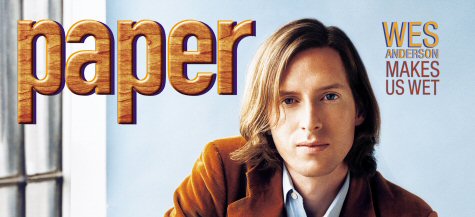
Anderson and Zissou costars Owen Wilson and Jeff Goldblum did a q & a on Monday night after a Variety series screening at Hollywood’s Arclight theatre. I would have made it but I was off seeing Million Dollar Baby. Moderator Pete Hammond told me all about it the next day.
“[Wes] was very good, very upbeat, but there wasn’t anything that he really said that he hasn’t said before. I opened it by reading an interview he did three years ago when Tenenbaums came out, about what he wanted to do next. He said, ‘I want to do something with big sets and but at the same time smaller and more emotional with a doumentary feel,’ and that’s exactly what he did with Aquatic.
“I asked him this time what he’s going to do next, and he said, ‘I don’t know….I think I’m gonna do something in India.”
Oh, no…he’s thinking about doing a Bollywood film? Or some kind of deadpan comedy about some New York advertising guy who burns out and goes to an ashram in northern India and meets up with the corrupt and bisexual son of Mararishi Mahesh Yogi? The mere thought of Owen Wilson sitting in the lotus position gives me the willies.
Clint Eastwood has just thrown
Clint Eastwood has just thrown a heavyweight punch in the Oscar race, and the after-effects will be felt all the way until Feb. 27. His boxing movie Million Dollar Baby (Warner Bros., 12.17, limited) had its first-anywhere showing at a very-limited-attendance screening last Friday night on the Warner Bros. lot, and then at a press-infiltrated Academy screening last night (Monday, 11.22) at the Director’s Guild. I’ve spoken to people who attended both, and they’re all seriously impressed or floored. (I was at the DGA screening also, and I fully concur.) Baby is a major art film… easily in the same realm as Clint’s Unforgiven, and, in the view of at least one major critic who attended the DGA screening, his best ever. Trust me, it’s a multi-Oscar nominee — Best Picture, Best Director (Eastwood), Best Actor (Eastwood), Best Actress (Hilary Swank). This means, of course, that Swank is once again duelling with Annette Bening — they last faced each other in the ’99 race when Swank’s Boys Don’t Cry performance beat Bening’s in American Beauty.
I missed the Variety item
I missed the Variety item last Thursday (11.18), but Bob Berney’s Newmarket Films has picked up Oliver Hirschbiegel’s Downfall, that German-produced, end-of-the-Third-Reich, down-in-the-bunker movie that I saw a few weeks ago and quite liked. Obviously angling for a Best Foreign Film Oscar nom, Downfall is “an exceptional historical piece [that’s] all about detail, detail and more detail,” I wrote on 11.3. “Not so much a Hitler character study as a Guernica-sized, pointillist portrait of the last remnants of Nazi culture collapsing into itself.” Pic was written and produced by Constantin Film’s Berndt Eichinger, and costars Bruno Ganz as Adolf Hitler, Alexandra Maria Lara as Hitler’s private secretary, Ulrich Matthes as Joseph Goebbels and Juliane Kohler as Eva Braun.
Time’s Richard Corliss has declared
Time‘s Richard Corliss has declared that Closer (Columbia, 12.3) “runs counter to the numbing predictability of most current films: the inevitable plot points of revenge and uplift, the reduction of human beings to heroes and villains, the avoidance of complexity in sexual matters.” And director Mike Nicohols observes in the same piece, “I thought we were way past being able to shock anybody …but people are shocked [by this film]. It’s not necessarily because of the language but because things that usually go unexplored are explored in public. Some people are armed against it. They say, ‘I just don’t know those people.’ Well, they’re you, man!”
Imelda Staunton’s highly-touted performance in
Imelda Staunton’s highly-touted performance in Mike Leigh’s Vera Drake (New Line) is falling off the screen as a Best Actress hopeful. One observer opined last night that Staunton and Drake peaked at the Venice Film Festival and just after, and have been fading ever since. One problem is that after Staunton’s Drake character gets popped for performing abortions, she goes into what amounts to a one- note emotional state of shock…eyes glazed over, look of horror on her face…and nothing more. Another problem is that no one has seen it. New Line is “having a hard time keeping it in theatres,” says one Academy pulse-taker. “In Los Angeles it’s currently hanging on at the Westside Pavilion and it’s already playing at the Pasadena Academy, a slightly discounted art house. Next they’ll probably send it to the Beverly Center, where movies go to die….”
Herald Tribune film critic Joan
Herald Tribune film critic Joan Dupont has written of Audrey Tatou, the radiant lead in Jean Piere Jeunet’s A Very Long Engagement: “From her films, it looks as if she is the only French actress to play the waif. She has stretched from cute Am√ÉÀÜlie to resolute Mathilde, a girl who wears the slightly morbid Japrisot stripe with panache.” Dupont refers to Sebastian Japrisot, the author of the original ’91 Engagement novel, as well the famed The Sleeping Car Murders.
